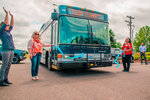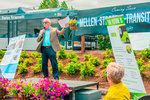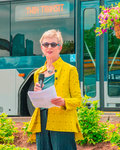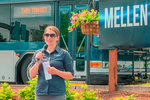





With the ceremonial giant scissors set aside, one of Twin Transit’s new electric buses slowly drove through blue tape Thursday afternoon, marking the official ribbon cutting and completion ceremony for the new Mellen Street e-Transit Station.
Located on a 2.5-acre lot at 1401 Mellen St. in Centralia, the new transit station boasts a contactless Wave induction charging unit for buses, two charging units for electric vehicles and infrastructure to install additional units.
The project marks an exciting turn for a transit authority eager to take major steps and investment in 21st century transit technology, including implementation of emissionless vehicles to help better connect Lewis County with communities in the north and south.
“This is an exciting and pivotal moment. We are on the threshold of something great and this is just the first step,” said Twin Transit Board Chair Rebecca Staebler. “I can’t wait to see what’s around the corner and who’s behind the wheel.”
In addition to its electric bells and whistles, the new station also serves as the connection spot for a new route that will run between Mellen Street and the Olympia Transit Center. Transit riders will have access to WiFi internet thanks to new tech installation during that new 34-minute commute.
The first bus on the new Olympia express route departed Mellen Street at 6 a.m. Friday and served as a first step in connecting public transportation riders in Lewis County to Thurston County and the greater Puget Sound region.
Twin Transit riders will also, for the first time, be able to connect to routes servicing SeaTac.
“When we arrived at Twin Transit in 2019, we discussed that you could not go from Centralia-Chehalis to Olympia or to Kelso-Longview. You could go from Olympia to Vancouver, Canada, on public transit; you could go from Kelso-Longview to Vancouver, Washington, on public transportation; but you could not go from here to either of those cities,” Twin Transit Executive Director Joe Clark said to a group of attendees Thursday. “Twin Transit was the broken link. We were determined to fix it, and tomorrow all that begins to change.”
“Today, we are no longer the broken link, rather the first link in a 50-mile electric and fuel cell corridor between Olympia and Kelso — one of the first corridors of this length in this country, and we are just getting started,” he continued.
The station was constructed thanks to $3.4 million in funding from the Washington State Department of Transportation’s 2020 Green Transportation Grant, the Diesel Emissions Reduction Act and the Volkswagen Clean Air Act Civil Settlement, Clark said.
The new station also includes plenty of parking for those looking to carpool.
Clark said Twin Transit is considering a similar station to the south, just off Interstate 5 at either exit 63 or 68, to connect in similar fashion with Longview-Kelso transit systems.
That project, currently in the early stages, is expected to open in the spring of 2023.
Josh Major, 34, and Matt Moir, 39, both neighbors living in Centralia, were among the few riders who watched the ribbon cutting ceremony. They’d just ridden the bus over to the Mellen Street station after a morning shopping trip at Walmart, their mobile cart filled with soda and a box of Slim Jims.
Both men ride the bus every day. Major, who has his driver’s license but is a loyal rider of 16 years, said he finds getting from place to place by transit the easiest.
“It’s a lifeline to my needs by transportation. It helps me get quicker access to services out in the community,” Major said.
They said they think the new station is intriguing.
Andrea Culletto, Twin Transit’s community relations director, said their greener and broader vision for public transit is unlike anything the community’s seen. The transit agency’s embrace of new technologies, she said, opens them up to larger possibilities.
“It matters because transportation is key to everything. It’s access to a quality, reliable job. It’s connection to quality education, through going to college or doing Running Start, vocational schools or an internship. It’s access to grocery shopping and other life-essential services for our seniors,” she said.
Richard DeBolt, a former lawmaker and current executive director at the Lewis Economic Development Council, said transportation is just one economic challenge that’s associated with regional growth. This innovative project, he said, sets the county apart and opens it up to broader investments in energy economic sectors.
“The more that we can hub energy companies in Lewis County, the better we can do. And Twin Transit is taking the lead not only on transportation, but on that part of the economic development puzzle,” DeBolt said, referring to the securement of Washington state’s first hydrogen refueling station in Chehalis.
Clark said Twin Transit has submitted grants to purchase two more electric buses, two hydrogen fuel-cell buses and money to install additional Wave induction chargers as demand increases. They also plan to work with the private sector to install electric vehicle charging along U.S. Highway 12 in Lewis County.
The ribbon cutting was provided by the Centralia-Chehalis Chamber of Commerce.